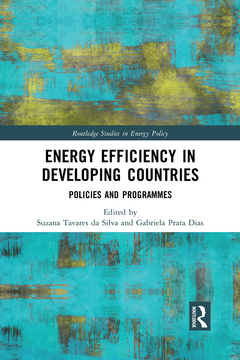Energy Efficiency in Developing Countries Policies and Programmes Routledge Studies in Energy Policy Series
Coordonnateurs : Tavares da Silva Suzana, Dias Gabriela Prata

This book presents a comparative analysis of energy efficiency policies in developing countries.
Although there is a vast amount of literature available about renewable energy policy and implementation in the developing world, energy efficiency tends to lack attention. This book fills this lacuna by examining the current state of the field and scope for future improvements. Drawing on a wide range of case studies including Brazil, China and Chile, the authors use a comparative approach to examine the policies and programmes being implemented, looking at the existing legal frameworks and regulatory challenges. By showcasing stories of success, as well as barriers to energy efficiency, they highlight the opportunities for increased energy access and efficiency and demonstrate how these opportunities may directly impact on climate change mitigation.
This volume will be a useful resource for scholars and practitioners with an interest in energy policy and efficiency, climate change and international development.
Part 1: Overview of Energy Efficiency Policies and Programmes and their Implementation 1. Energy Efficiency Policies and Programmes in Developing Countries Part 2: Policy and Regulatory Challenges 2. Legal Framework and Public Policies on Energy Efficiency in Spain and Chile 3. Regulating Energy Efficiency in Brazil 4. Energy Efficiency Policy as a Tool for Development 5. Legal Framework and Public Policies on Energy Efficiency in Some Portuguese Speaking Countries 6. Linkages Between National Targets for Energy Efficiency and NDCs in South America 7. A Review of China's Energy Efficiency Policies and Programmes for the Industrial Sector since 1990 8. Uruguay 9. The Impact of Electricity Generating Authority of Thailand’s Demand Side Management Programme and Incentives for Small Power Producers for Energy Efficiency in Thailand 10. Energy Efficiency Policies and Programmes in Kenya 11. High-impact Opportunities for Energy Efficiency: A Case Study of Improved Cookstoves in Ghana 12. Energy Efficiency Policies and Programmes in Eastern Partnership and Central Asia Countries PART 3: New Trends in Energy Efficiency Implementation Tools 13. Behavioural Insights for Energy Efficiency Improvement in Developing Country Cities 14. Sustainability Indicators of District Energy System and their Applications in Pilot Cities of India and Malaysia 15. Regulations and Incentive Policy Framework for District Energy System Development 16. Integration of Low Carbon Technologies into District Heating Systems of Developing Countries of Cold Climatic Zones 17. Policy Measures for Improved Energy Efficiency in the Road Transport Sector 18. Electric Vehicles Penetration in India for Enhanced Energy Efficiency Deployment in the Transport Sector 19.Energy Efficiency in the Georgian Building Sector
Suzana Tavares da Silva is a public law professor at the University of Coimbra, Portugal and Justice at the Portuguese Administrative Supreme Court
Gabriela Prata Dias is a geographer and is currently Head of the Copenhagen Centre on Energy Efficiency and Head of Strategy at UNEP DTU Partnership, Denmark
Date de parution : 09-2021
15.6x23.4 cm
Disponible chez l'éditeur (délai d'approvisionnement : 14 jours).
Prix indicatif 48,88 €
Ajouter au panierDate de parution : 02-2020
15.6x23.4 cm
Disponible chez l'éditeur (délai d'approvisionnement : 14 jours).
Prix indicatif 160,25 €
Ajouter au panierThèmes d’Energy Efficiency in Developing Countries :
Mots-clés :
Energy Efficiency; national energy conservation programmes; BAU Scenario; renewable energy policy; Energy Efficiency Gap; energy efficiency policies; Energy Policies; climate change mitigation; Energy Resources; Energy Saving; Energy Sources; Energy Conservation; EE Policy; Electric Vehicles; National Energy Efficiency Action Plan; District Energy Systems; District Cooling Systems; National Action Plan; MEPS; Energy Systems; Energy Consumers; EPC; District Energy; Energy Certification; Cost Effective Energy Efficiency Measures; District Cooling; Clean Cookstoves; National Energy Efficiency; ESCO



